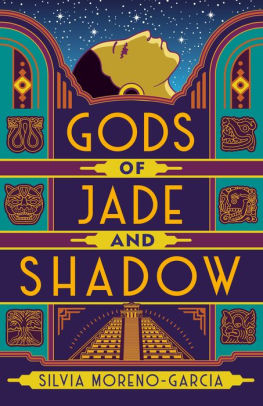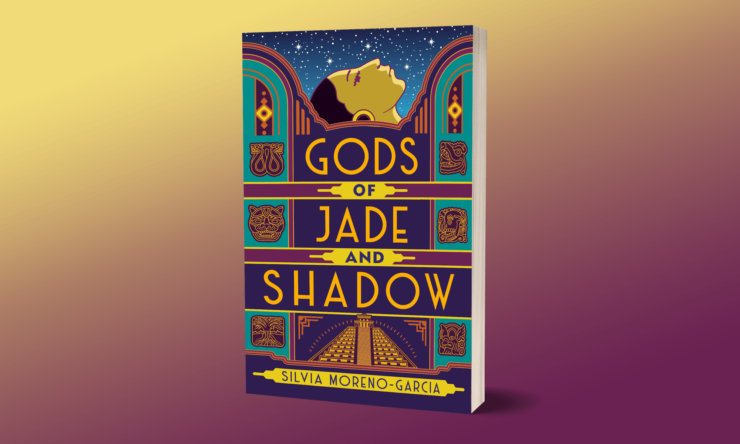Since the original conquests and subsequent waves of colonization, it has been a struggle for pre-Hispanic indigenous communities to keep their traditional stories alive; as elders pass on, oral stories can die with them. Most people outside of these communities will not hear of these stories outside of anthropology or world literature textbooks. Yet sharing these stories with others, while mixing in historical context and her own fantastical elements, is exactly what author Silvia Moreno-Garcia is doing in her latest novel, Gods of Jade and Shadow.
When Casiopia Tun, the eighteen year old granddaughter of a wealthy man in 1920s Yucatan, Mexico discovers the bones of a god locked in her grandfather’s chest, she unintentionally begins a journey that will change the course of her life as a glorified servant to her family and put her on the path to an adventure, and a freedom that she never imagined.
Gods of Jade and Shadow is epic in scope, reminding me tonally of Neil Gaiman and Terry Pratchett’s Good Omens, with humorous, biting depictions of the characters and towns they travel through. The book contains a mixture of social and historical commentary, humor, supernatural mystery and the everyday lives of its characters. The hero, Casiopia, embarks on a quest with her companion, Hun-Kamé, displaced Lord of Xibalba, the mythical Mayan underworld, as they travel together to restore his power and regain his throne from his usurping brother, Vucub-Kamé. The narrative emphasizes the Mayan Lords of the Underworld and their supernatural powers in equal measure with Casiopia and her journey towards self-determination and autonomy. As the novel progresses, the supernatural power of the gods and the vulnerability of mortal humans begin to bleed together, reflecting on the nature of death, destiny, what it means to be human, and what it means to be a god in a world that has all but forgotten you.
There was much to admire about this book, but one thing I appreciated in particular was the omniscient narrator providing social and historical landscapes of Mexico, Texas, and Xibalba with a level of vivid, arresting detail these places don’t often get outside of travel magazines or anthropological texts, from an outsider’s point of view. The narrator spends as much time placing the reader firmly in the Jazz age of Mexico, post-revolution, as they do weaving the tale of Casiopia and Hun-Kamé. I wondered at this decision, but the more I read, the more fitting it seemed. In Mexico, this was a time of revitalization, for better or worse—a time when Mexico’s urban cities were attempting to keep up with rapid modernity. Likewise, an internal revolution occurs in Casiopia as she leaves her home in Uukumil; her personal change is evident. As she and Hun-Kamé grow closer, their destinies entwined, each place they travel to reflects the changes in their relationship.
Buy the Book


Gods of Jade and Shadow
I also appreciated how Moreno-Garcia incorporates traditional Ki’che Mayan tales from the Popol Vuh, one of the only ancient texts from the region to have been translated from oral stories and written by Franciscan monks. The stories and characters are integrated into this historical novel and give life to these stories in a way I have not seen before, even as an avid reader of supernatural and fantastical fiction. By using these stories and expanding on them to incorporate contemporary elements, the author does them service, bringing them to new audiences and expanding on them in her own imaginative way. The descriptions of the spirits, demons and creatures of the underworld that move through time and space are poetic; they rendered the characters in my imagination in ways both cinematic and surreal. Moreno-Garcia also includes a note and a glossary at the end of the book to acknowledge words and concepts that some readers might not be familiar with. She also acknowledges that, while she uses these traditional Mayan words and stories to create her own, as an author of fiction—not an anthropologist—she is not providing the same exactitude an academic scholar might. I felt that this was a way to acknowledge her own closeness to these stories as a woman of Mexican descent, as well as a way to show that, when stories are taken through colonization, it is difficult to find our way back to them; we must therefore treat them with care.
As a protagonist, Casiopia is an engaging character to follow. She is cast early on in the book as a Cinderella figure, mistreated and subjected to labor for her extended family and considered a bastard because her parents had her out of wedlock. Though in the beginning, this description of her renders her character a bit one-dimensional, as fairy tales often do, she is a character that does come to life for the reader throughout the book. Her motivations in the book are clear from the beginning: She wants to be anywhere than where she is. However, once she is gone from her home and sets out on her quest,to help Hun-Kamé and save her own life, Casiopia is forced to confront that her life will never be the same again; that sometimes, your actions have made it so that you cannot return to what you once were. This is also reflected in Hun-Kamé, who struggles on his path back home, as so much has changed since he was cast out of Xibalba and imprisoned by his brother. While the stakes are high for all of the characters, the book strikes a strong balance between the epic scope of the adventure at hand, and the rich internal lives of the characters.
Ultimately, what kept me reading was the deliberate way that Moreno-Garcia depicts a strong sense of time, and how our traditional stories are inextricable from our histories.
Gods of Jade and Shadow is available from Del Rey.
Leticia Urieta is proud Tejana writer from Austin, TX. She works as a teaching artist in the Austin community. She is a graduate of Agnes Scott College and holds an MFA in Fiction writing from Texas State University. Her work appears or is forthcoming in Cleaver, Chicon Street Poets, Lumina, The Offing, Kweli Journal, Medium, Electric Lit and others. Her chapbook, The Monster is out now from LibroMobile Press. She is currently at work completing her novel that tells the story of a Mexican soldadera caught up in the march to Texas during Texas’ war with Mexico.










